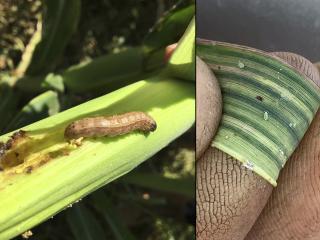Western Australia
February 23, 2021

Grain growers have been warned to monitor crops for the potentially significant pests fall armyworm (left) and Russian wheat aphid (right) this spring and report observations to DPIRD.
Western Australian grain growers have been warned to prepare to take action to protect crops from two additional, significant grain pests this spring – Russian wheat aphid and fall armyworm.
The warning was delivered at the Grains Research and Development Corporation’s Grains Research Updates 2021 conference in Perth today by researchers from the Department of Primary Industries and Regional Development.
Russian wheat aphid and fall armyworm were detected in WA for the first time in 2020, with numbers predicted to increase this growing season.
DPIRD research scientist Svetlana Micic told the conference while the impact from Russian wheat aphid was limited to the Esperance region in 2020, it was important for growers to remain vigilant this season.
“Russian wheat aphid surveys of a total of 121 sites throughout the Grainbelt in 2020 found the pest at 24 sites only in the Esperance region,” Ms Micic said.
“The pest was found on early and late sown barley and wheat crops in low, medium and high rainfall areas at levels of less than one percent of tillers infested with Russian wheat aphid, which was well below control thresholds.”
Climatic modelling by a collaboration of scientists from across Australia and New Zealand predicts Russian wheat aphid has the potential to persist in all broadacre growing areas of the WA Grainbelt.
“Though the pest was not found outside the Esperance Port Zone in 2020, it is highly probable that it will migrate beyond that area and spread throughout the entire Grainbelt,” Ms Micic said.
Fall armyworm moths were detected at trap sites near Geraldton and Gingin but none were found in 70 pheromone traps in the Grainbelt during the 2020 growing season, however, larvae were confirmed at Gingin.
Department research scientist Dustin Severtson said as the pest was highly mobile and could fly vast distances, it was possible it could pose a risk to cereal, canola and pulse crops this spring.
“While fall armyworm was not detected in grain crops and pastures in 2020, growers should remain observant and report any suspect caterpillars to the department to confirm identification of the pest and attain control advice,” Dr Severtson said.
Information on the department’s fall armyworm and Russian wheat aphid surveillance programs has been extended to the industry via its PestFax newsletter, with co-investment from GRDC, which supports research on these pests in other parts of Australia.
The national technical committee, the Consultative Committee on Emergency Plant Pests has concluded it is not technically feasible to eradicate either Russian wheat aphid or fall armyworm from Australia.
Landholders are encouraged to monitor crops for the two pests and to report any suspect observations, including photographs, to the department using its MyPestGuide Reporter or PestFax Reporter apps.
Alternatively, call the department’s Pest and Information Disease Service on 9368 3080 or send a photograph to padis@dpird.wa.gov.au. Samples should only be sent if requested to do so.
A range of control and management options are available for Russian wheat aphid and fall armyworm on the department’s website agric.wa.gov.au. Information is also available on the GRDC fall armyworm portal.
Following the Perth Update, GRDC 2021 Regional Updates are scheduled to be held in each port zone. For details visit the GRDC Updates and events page.